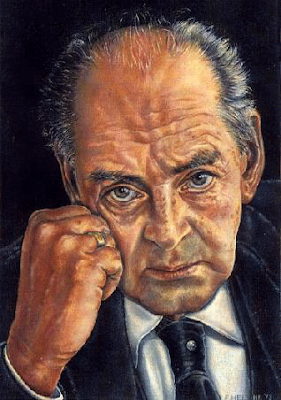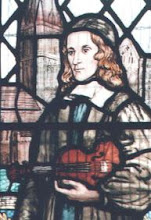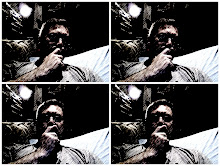Monday, August 25, 2008
Henry Vaughan: The Water-Fall
With what deep murmurs,through time's silent stealth,
Doth thy transparent, cool, and wat'ry wealth,
Here flowing fall,
and chide and call,
As if his liquid, loose retinue stay'd
Ling'ring, and were of this steep place afraid,
The common pass,
Where clear as glass,
All must descend ,
Not to an end,
But quick'ned by this deep and rocky grave,
Rise to a longer course more bright and brave.
Dear stream ! dear bank ! where often I
Have sat, and pleased my pensive eye,
Why, since each drop of thy quick store
Runs thither whence it flow'd before,
Should poor souls fear a shade or night,
Who came (sure) from a sea of light?
Or since those drops are all sent back
So sure to thee, that none doth lack,
Why should frail flesh doubt any more
That what God takes, He'll not restore?
O useful element and clear!
My sacred wash and cleanser here,
My first consigner unto those
Fountains of life, where the Lamb goes?
What sublime truths and wholesome themes
Lodge in thy mystical, deep streams!
Such as dull man can never find,
Unless that Spirit lead his mind,
Which first upon thy face did move
And hatch'd all with His quick'ning love.
As this loud brook's incessant fall
In streaming rings restagnates all,
Which reach by course the bank, and then
Are no more seen, just so pass men.
O my invisible estate,
My glorious liberty, still late!
Thou art the channel my soul seeks,
Not this with cataracts and creeks.
Henry Vaughan, The Complete Poems. Ed. Alan Rudrum
pg. 306-307
Saturday, August 23, 2008
Geoffrey Hill - "Tragedy has us all under regard"

Tristia: 1891-1938
A Valediction to Osip Mandelstam
Difficult friend, I would have preferred
You to them. The dead keep their sealed lives
And again I am too late. Too late
The salutes, dust-clouds and brazen cries.
Images rear from desolation
Look...ruins upon a plain...
A few men glare at their hands; others
Grovel for food in the roadside field.
Tragedy has us all under regard.
It will not touch us but it is there -
Flawless, insatiate - hard summer sky
Feasting on this, reaching its own end.
Saturday, August 16, 2008
The Wisdom of George Herbert

Life is half spent before we know what it is. A gentle heart is tied with an easy thread.
Dare to be true. Nothing can need a lie: a fault which needs it most, grows two thereby.
Do not wait; the time will never be "just right."
Start where you stand, and work with whatever tools you may have at
your command, and better tools will be found as you go along.
Good words are worth much, and cost little.
He that cannot forgive others, breaks the bridge
over which he himself must pass if he would ever reach heaven; for
everyone has need to be forgiven.
In conversation, humor is worth more than wit and easiness more than knowledge.
Living well is the best revenge.
Love and a cough cannot be hid.
None knows the weight of another's burden.
One father is more than a hundred schoolmasters.
Punishment is lame, but it comes.
Sometimes the best gain is to lose.
There is an hour wherein a man might be happy all his life, could he find it.
There is great force hidden in a gentle command.
Speak not of my debts unless you mean to pay them.
Thursday, August 14, 2008
Real Things, Fogs, Towers, & Bridges: Nabokov's Ada

An individual's life consisted of certain classified things: 'real things' which were unfrequent and priceless, simply 'things' which formed the routine stuff of life; and 'ghost things,' also called 'fogs,' such as fever, toothache, dreadful disappointments, and death. Three or more things occurring at the same time formed a 'tower,' or, if they came in immediate succession, they made a 'bridge.' 'Real towers' and 'real bridges' were the joys of life, and when the towers came in a series, one experienced supreme rapture; it almost never happened, though. In some circumstances, in a certain light, a neutral 'thing' might look or even actually become 'real' or else, conversely, it might coagulate into a fetid 'fog.' When the joy and the joyless happened to be intermixed, simultaneously or along the ramp of duration, one was confronted with 'ruined towers' and 'broken bridges.'
Vladimir Nabokov, Ada or Ardor: A Family Chronicle, 74.23 - 75.03
Sunday, August 3, 2008
Auden Quote from Movie "Away from Her" (2006)

I watched the movie Away from Her (2006) last night. A wonderful, yet tragic exploration of the drift into Alzheimer's and the December romances that can be developed between those who share this disease. Tormented by his own memories that he all too much would like to forget, Grant realizes the ironic truth that his beloved wife Fiona has (at times) nearly forgotten him, but not his act of betrayal.
As she drifts deeper into the forgetfulness of Alzheimer's, Grant reads to her from "Letters From Iceland" by W.H. Auden and Cecil Day Lewis.
"Isn't it true however far we've wandered into our provinces of persecution, where our regrets accuse, we keep returning back to the common faith from which we've all dissented, back to the hands, the feet, the faces? Children are always there and take the hands, even when they are most terrified. Those in love cannot make up their minds to go or stay. Artist and doctor return most often. Only the mad will never, never come back. For doctors keep on worrying while away, in case their skill is suffering or deserted. Lovers have lived so long with giants and elves, they want belief again in their own size. And the artist prays ever so gently, let me find pure all that can happen. Only uniqueness is success. For instance let me perceive the images of history. All that I push away with doubt and travel, today's and yesterdays alike, like bodies."
Clasping of Hands - Commentary on Song of Songs

Clasping of hands.
|
|
Subscribe to:
Posts (Atom)




